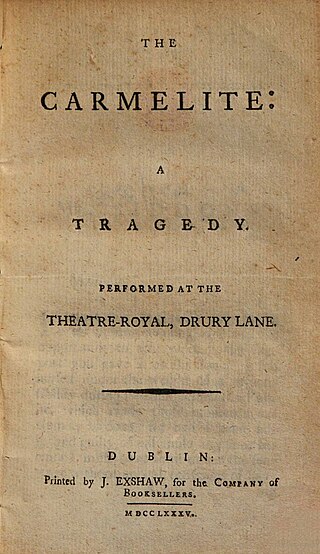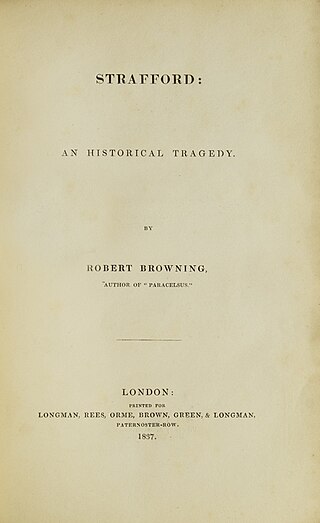Related Research Articles
Nicoll Scrub is a national park in South East Queensland, Australia, 88 km southeast of Brisbane. It adjoins the Currumbin Valley Reserve and protects remnant rainforest vegetation. The park occupies the area between Mount Coolagang and Mount Boololagung of the McPherson Range.

Sir John Fearns Nicoll was a British colonial administrator who served as Governor of Singapore from 1952 to 1955.

John Ramsay Allardyce Nicoll was a Scottish literary scholar and teacher.

Lieutenant General Sir Jasper Nicolls KCB was Commander-in-Chief, India.

The Battle of Hastings is a 1778 play by the English writer Richard Cumberland. It is a tragedy set around the Battle of Hastings in 1066. It was staged at the Drury Lane Theatre in October 1778 by Richard Brinsley Sheridan. Sheridan later mocked Cumberland's sensitivity to criticism by modelling the character Sir Fretful Plagiary, in his 1779 play The Critic, after him.
The Lord of the Manor is a comic opera by the British soldier and playwright John Burgoyne. It was first staged at the Drury Lane Theatre in December 1780. It was written by Burgoyne for his lover, the actress Susan Caulfield.
Richard Coeur de Lion: An historical romance is a 1786 semi-opera with an English text by John Burgoyne set to music by Thomas Linley the Elder. It was first staged at Drury Lane Theatre in October 1786. It was a translation of Michel-Jean Sedaine's opera Richard Coeur-de-lion about the life of the English Monarch Richard I with the ending significantly changed. The work was a major success and ran for 43 performances and was revived seven times before the end of the century. By contrast a rival version staged at the Covent Garden Theatre at the same time was a failure.
First Love is a 1795 sentimental comedy play by the British playwright Richard Cumberland. It was first performed at the Drury Lane Theatre in May 1795. Frederick Mowbray becomes the protector of Sabrina Rosny after her abandonment by Lord Sensitive.

The Jubilee is a 1769 play by the British playwright and actor-manager David Garrick, with music by Charles Dibdin. It was based on his Shakespeare Pageant which he had originally planned to stage during the Shakespeare Jubilee in Stratford-upon-Avon until heavy rain forced it to be abandoned. It was first performed at the Drury Lane Theatre on 14 October 1769 and proved a major success, running for ninety performances. This allowed Garrick to recoup much of the money he had spent on the Jubilee celebrations.

The Carmelite is a 1784 tragedy by the British writer Richard Cumberland. It was first staged at the Drury Lane Theatre on 2 December 1784. The play's hero Saint-Valori disguises himself as a Carmelite. The original cast included Sarah Siddons as Matilda, William Smith as Saint Valori, John Palmer as Lord Hildebrand, John Philip Kemble as Montgomeri, James Aickin as Lord De Courci, John Hayman Packer as Gyfford, John Phillimore as Fitzallan and John Fawcett as Raymond. The play enjoyed some success, and was later staged at a theatre in Belfast where Wolfe Tone saw it in 1791.

Clementina is a tragic play by the Irish writer Hugh Kelly. It was first staged at Theatre Royal, Covent Garden in February 1771. The plot follows a young Italian woman Clementina's marriage to Rinaldo despite her father's opposition to the wedding as he had wished her to marry Palermo. It ends with Palmero killing Rinaldo, and Clementina committing suicide in her despair.
Canaries Sometimes Sing is a comedy play by the British writer Frederick Lonsdale that was first staged in 1929 at the Globe Theatre in the West End. It represented the breakthrough role as a solo performer of the French comedienne Yvonne Arnaud.

The Suspicious Husband is a 1747 comedy play by the British writer Benjamin Hoadly.

The Road to Ruin is a 1792 comedy play by the British writer Thomas Holcroft.

The Hypocrite is a 1768 comic play by the Irish writer Isaac Bickerstaffe. It is a reworking of the 1717 play The Non-Juror by Colley Cibber, itself inspired by Molière's Tartuffe.
The Adventures of Five Hours is a 1663 comedy play by the English writer Sir Samuel Tuke, 1st Baronet. Based on the play Los empenos de seis horas by Antonio Coello, It is an early example of the developing Restoration comedy tradition. Its success led to a series of sentimental plays in the Spanish style about love and honour, very different to the more sophisticated and cynical comedies which the Restoration era became known for.
The Massacre of Paris is a 1689 tragedy by the English writer Nathaniel Lee. It was first staged by the United Company at the Theatre Royal, Drury Lane. It is based around the 1572 St. Bartholomew's Day massacre which led the killing of many Huguenots during the French Wars of Religion. The events had previously been portrayed in Christopher Marlowe's Elizabethan play The Massacre at Paris.
The Man of Newmarket is a 1678 comedy play by the English writer Edward Howard. It was first staged at the Theatre Royal, Drury Lane by the King's Company.

Strafford is an 1837 tragedy by the British writer Robert Browning. It portrays the downfall and execution of Lord Strafford, the advisor to Charles I shortly before the English Civil War.
The Merchant of London is an 1832 historical play by the British writer Thomas James Serle. It premiered at the Theatre Royal, Drury Lane on 26 April 1832. The original cast included William Macready as Scroope, Henry John Wallack as Edward Beaufort, John Cooper as Richard Fitzalan, John Pritt Harley as Flaw, and Paul Bedford as Bloodmore. It takes place in Elizabethan London.